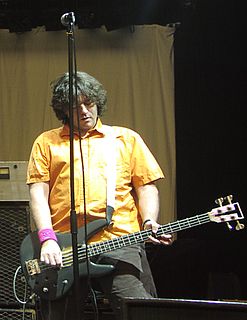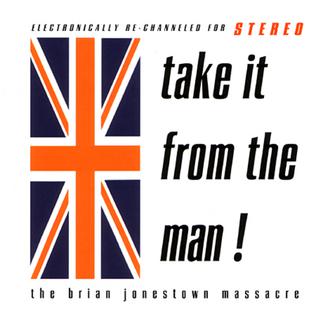Related Research Articles
Hard rock or heavy rock is a loosely defined subgenre of rock music typified by a heavy use of aggressive vocals, distorted electric guitars, bass guitar, and drums, sometimes accompanied with keyboards. It began in the mid-1960s with the garage, psychedelic and blues rock movements. Some of the earliest hard rock music was produced by the Kinks, the Who, the Rolling Stones, the Yardbirds, Cream and the Jimi Hendrix Experience. In the late 1960s, bands such as the Jeff Beck Group, Iron Butterfly, the Beatles, Led Zeppelin, Golden Earring, Steppenwolf and Deep Purple also produced hard rock.
Garage rock is a raw and energetic style of rock and roll that flourished in the mid-1960s, most notably in the United States and Canada, and has experienced a series of subsequent revivals. The style is characterized by basic chord structures played on electric guitars and other instruments, sometimes distorted through a fuzzbox, as well as often unsophisticated and occasionally aggressive lyrics and delivery. Its name derives from the perception that groups were often made up of young amateurs who rehearsed in the family garage, although many were professional.

The Adolescents are an American punk rock band formed in Fullerton, California in 1980. Part of the hardcore punk movement in southern California in the early 1980s, they were one of the main punk acts to emerge from Orange County, along with their peers in Agent Orange and Social Distortion. Founding bassist Steve Soto was the sole constant member of the band since its inception until his 2018 death, with singer Tony Reflex being in the group for all but one album.
Tribal Tech is a progressive fusion band, originally formed in 1984 by guitarist Scott Henderson and bass player Gary Willis. From 1993 forward the band included Scott Kinsey on keyboard and Kirk Covington on drums, and has produced nine albums that stretch the borders between blues, jazz, and rock. The band dissolved following the release of 2000's Rocket Science, with the various members pursuing solo careers. However, they re-formed to release another album, X, in 2012.

James Henry Cotton was an American blues harmonica player, singer and songwriter, who performed and recorded with many of the other great blues artists of his time and with his own band. He played drums early in his career but is famous for his harmonica playing.

Bob Weston is an American musician, producer, recording engineer, and record mastering engineer. Critic Jason Ankeny declares that "Weston's name and fingerprints are all over the American underground rock of the post-punk era, producing and engineering dates for a seemingly endless number of bands." As a performer, Weston is best known as the bass guitarist in the groups Volcano Suns and Shellac.

Take It from the Man! is the third studio album by American psychedelic rock band the Brian Jonestown Massacre. After recording their shoegaze-influenced debut album Methodrone (1995) and releasing a collection of early recordings, Spacegirl & Other Favorites, the band took influence from 1960s British psychedelic garage rock and recorded Take it from the Man! from November 1995–February 1996. After recording the entire album with an unnamed producer who scrapped the recordings, the band re-recorded the album on a minimal budget, mostly at Lifesource Studios in Emeryville, California with production from Psychic TV's Larry Thrasher, whose usual "studio" approach was vetoed out by the band's back-to-basics approach.
Juicy Lucy was a British blues rock band officially formed on 1 October 1969. After the demise of The Misunderstood, Juicy Lucy was formed by steel guitarist Glenn Ross Campbell, and prolific Blackburn saxophonist Chris Mercer. The group later recruited vocalist Ray Owen, guitarist Neil Hubbard, bassist Keith Ellis, and drummer Pete Dobson.
Willie Kent was an American Chicago blues singer, bassist and songwriter.
David Trumfio is an American record producer, mixer, engineer and musician, best known for his production work with artists such as Wilco and his recordings with his own band The Pulsars.

Jimmy Burns is an American soul blues and electric blues guitarist, singer and songwriter. Although he was born in the Mississippi Delta, Burns has spent nearly all his life in Chicago. His elder brother, Eddie "Guitar" Burns, was a Detroit blues musician.
Bobo Jenkins was an American Detroit blues and electric blues guitarist, singer and songwriter. He also built and set up his own recording studio and record label in Detroit. Jenkins is best known for his recordings of "Democrat Blues" and "Tell Me Where You Stayed Last Night".

OC Confidential is the fourth studio album by the American punk rock band the Adolescents, released in July 2005 on Finger Records. It was their first studio album since 1988, and followed their reunion in 2001 after a twelve-year breakup. The album features founding band members Tony Reflex, Frank Agnew, and Steve Soto, joined by drummer Derek O'Brien. It was the final Adolescents album to include Agnew, and their only studio album with O'Brien.
Little Arthur Duncan was an American Chicago blues and electric blues harmonica player, singer, and songwriter. He was a member of the Backscratchers and over his career was associated with Earl Hooker, Twist Turner, Illinois Slim and Rick Kreher.
The Aluminum Group is an American pop band from Chicago, Illinois centered on brothers John and Frank Navin. The band has released seven albums on the Minty Fresh, Hefty, Wishing Tree, and P-Vine labels.
Floyd Miles was an American electric blues and soul blues guitarist, singer and songwriter. He released four solo albums from 1992 onwards.
Daughters of Eve were an American all-female garage rock band formed in Chicago, Illinois in 1965. The group was formed and managed by Carl Bonafede, who was managing The Buckinghams as they were gaining national success. The Daughters of Eve is considered the first female rock band from Chicago, and the group released four singles during their existence, all produced by Bonafede, before disbanding in 1968.

Apple Pie Motherhood Band was an American psychedelic rock band formed in Boston, Massachusetts, in 1967. One of the several groups involved in the "Bosstown Sound", a commercial ploy designed to compete with the San Francisco Sound, the band developed a blend of psychedelia, blues rock, and hard rock, which was exemplified and expanded upon on their two albums. The group went through several line-up changes before disbanding in 1970.
Death Ride 69 were a tribal industrial garage band that formed in Los Angeles led by Linda LeSabre (Beatmistress). The original incarnation was a duo consisting of guitarist Don Diego and vocalist Linda LeSabre. The band also featured contributions from Mark Blasquez, Ethan Port, Wrex Mock, Dave Haas and Buc Bono. They released two full-length albums, Death Ride 69 produced by Scott Arundale in 1988 and Screaming Down the Gravity Well in 1996.
References
- ↑ Jason Ankeny. "The Little Boy Blues". allmusic.com. Retrieved May 16, 2015.
- ↑ Jason Ankeny. "The Little Boy Blues". allmusic.com. Retrieved May 16, 2015.
- ↑ Jason Ankeny. "The Little Boy Blues". allmusic.com. Retrieved May 16, 2015.
- ↑ Jason Ankeny. "The Little Boy Blues". allmusic.com. Retrieved May 16, 2015.
- ↑ "Little Boy Blues". modernist.com. Retrieved May 16, 2015.
- ↑ Jason Ankeny. "The Little Boy Blues". allmusic.com. Retrieved May 16, 2015.
- ↑ Jason Ankeny. "The Little Boy Blues". allmusic.com. Retrieved May 16, 2015.
- ↑ "Little Boy Blues". modernist.com. Retrieved May 16, 2015.
- ↑ Jason Ankeny. "The Little Boy Blues". allmusic.com. Retrieved May 16, 2015.
- ↑ Jason Ankeny. "The Little Boy Blues". allmusic.com. Retrieved May 16, 2015.
- ↑ Jason Ankeny. "The Little Boy Blues". allmusic.com. Retrieved May 16, 2015.
- ↑ Jason Ankeny. "The Little Boy Blues". allmusic.com. Retrieved May 16, 2015.
- ↑ Jason Ankeny. "The Little Boy Blues". allmusic.com. Retrieved May 16, 2015.
- ↑ "Little Boy Blues". modernist.com. Retrieved May 16, 2015.
- ↑ Jason Ankeny. "The Little Boy Blues". allmusic.com. Retrieved May 16, 2015.
- ↑ Jason Ankeny. "The Little Boy Blues". allmusic.com. Retrieved May 16, 2015.
- ↑ Jason Ankeny. "The Little Boy Blues". allmusic.com. Retrieved May 16, 2015.
- ↑ Jason Ankeny. "The Little Boy Blues". allmusic.com. Retrieved May 16, 2015.
- ↑ Jason Ankeny. "The Little Boy Blues". allmusic.com. Retrieved May 16, 2015.
- ↑ Jason Ankeny. "The Little Boy Blues". allmusic.com. Retrieved May 16, 2015.
- ↑ Jason Ankeny. "The Little Boy Blues". allmusic.com. Retrieved May 16, 2015.
- ↑ Jason Ankeny. "The Little Boy Blues". allmusic.com. Retrieved May 16, 2015.
- ↑ "Little Boy Blues". modernist.com. Retrieved May 16, 2015.
- ↑ Jason Ankeny. "The Little Boy Blues". allmusic.com. Retrieved May 16, 2015.
- ↑ Jason Ankeny. "The Little Boy Blues". allmusic.com. Retrieved May 16, 2015.
- ↑ "Jay-Z Scores U2, Kanye West for 'NBA 2K13' Soundtrack" . Retrieved 2016-09-16.